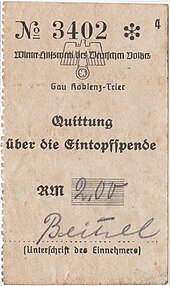Stew Sunday

As a stew Sunday , a propaganda campaign was introduced in Germany from October 1, 1933 by the Nazi regime as a sign of solidarity with the national community . In addition, it was possible to reduce the so-called fat gap , which could only be compensated by importing foreign currencies.
execution
General
From October to March, all German households should only eat stew once a month . The difference between the cost of the otherwise usual Sunday meal and the effort required for stew, generally estimated at 50 pfennigs "from above", was collected from the door-to-door control room of the NSDAP and benefited the recently founded winter relief organization. The savings were reportedly often greater, such as For example, a recipe for a 4-person stew for 1.18 RM from 1933.
In the newspapers, stew recipes were repeatedly published as suggestions; a stew cookbook by Erna Horn was also published . Leading personalities of the Nazi regime such as Adolf Hitler and Joseph Goebbels used the public stew as a means of propaganda .
“Stew Sunday should not only serve the idea of the national community materially [through the donation], but also ideally. It is not enough for someone to donate a stew but consume their usual Sunday meal. The whole German people should consciously sacrifice on this stew Sunday [...] in order to help needy national comrades. "
In the Second World War , the term “stew Sunday” was abolished. Instead, the term “Sacrifice Sunday” was introduced, which was reserved for the Winter Relief Organization alone.
In the “Skagerrak Calendar 1941” (editorial deadline in the course of 1940), the victims' Sundays are still entered as “stew Sunday” - on the second Sunday of the months January to March and October to December.
Example Hamburg
In Hamburg, for example, around 65 percent of all households donated on February 4, 1934 (namely 231,616 of 354,500), which resulted in a total of 104,200 Reichsmarks. In this way, over 31 million Reichsmarks were collected through the stew Sundays in the winter of 1935/36; this sum corresponded to the income that was achieved by the street collections of the winter relief organization. One spoke of "German socialism in fact".
Example Kassel
The Kasseler Post wrote in October 1934: “In the name of the Winter Relief Organization of the German People 1934/35, the following Sundays have been designated as stew Sundays: October 14, November 18, December 16, January 13, 1935, February 17, December 17 . March. Only the following three stew dishes are permitted for October 14th: 1. Spoon peas with a filler; 2. noodle soup with beef; 3. Stock pot with meat (cooked together). Either sausage, pig's ear or cured meat with peas 'filler'. Corresponding dishes are specified for the following stew Sundays. All restaurants are divided into three classes, which serve dishes at 0.70 RM, 1 RM and 2 RM. The guests receive a receipt from a numbered receipt block for the amount paid to the Winter Relief Organization. "
Interpretations
Norbert Frei points out that the “regular simple meals” also conserved economic resources somewhat, but their “socio-psychological purpose” was far more important for the regime: Stew Sunday was a “showpiece of National Socialist“ public education ”” and suggested a collective willingness to make sacrifices. The message was: The national community exists and everyone is participating.
literature
- Keyword stew Sunday . In: Cornelia Schmitz-Berning: Vocabulary of National Socialism . Walter de Gruyter, Berlin 1998, pp. 173f.
Web links
- Searching for Nazi traces in the state of Braunschweig: Stew and Stew Sunday
- “Stew, Victim Sunday!” Propaganda poster of the War Winter Aid Organization
- Hitler speech at the opening of the WHW 1936 film excerpt 3:25 (Hitler on Stew Sunday)
Individual evidence
- ↑ Hans-Jörg Wohlfromm, Gisela Wohlfromm: "And tomorrow there will be Hitler weather!" Everyday and curious things from the Third Reich. Anaconda Verlag, Cologne 2017, p. 31.
- ^ Meyer's Lexicon. 1937, p. 528.
- ↑ Herwart Vorländer: The NSV. Representation and documentation of a National Socialist organization. Boppard am Rhein 1988, ISBN 3-7646-1874-4 , p. 396.
- ↑ Peter Zolling: Between Integration and Segregation - Social Policy in the “Third Reich” using the example of the NSV in Hamburg. (Diss.) Frankfurt / M. 1986, ISBN 3-8204-8530-9 , p. 180.
- ↑ LeMo: Stew Sunday .
- ↑ Winter Relief Organization of the German People 1937/38: Accountability Report . Edited by the Reich Commissioner for the WHW.
- ↑ HNA Regiowiki: The national community eats pea stew .
- ↑ Norbert Frei: The Führer State. National Socialist rule 1933 to 1945 . Munich 2013, ISBN 978-3-406-64449-8 , p. 112.


